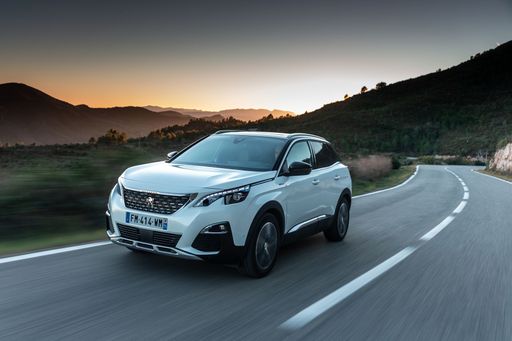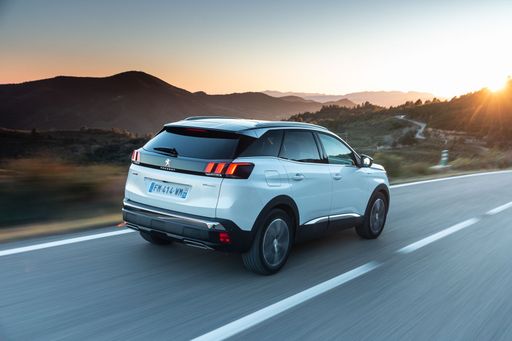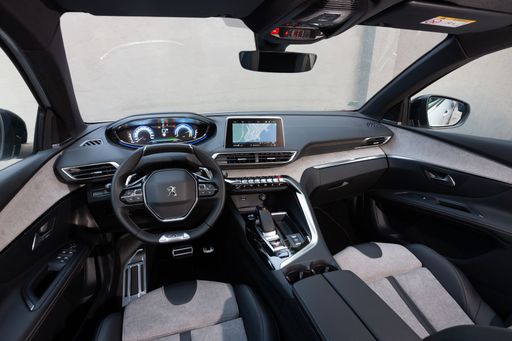Hyundai Kona vs Peugeot 3008 - Differences and prices compared
Compare performance (218 HP vs 325 HP), boot space and price (23100 £ vs 35100 £ ) at a glance. Find out which car is the better choice for you – Hyundai Kona or Peugeot 3008?
Costs and Efficiency:
Price and efficiency are often the first things buyers look at. Here it becomes clear which model has the long-term edge – whether at the pump, the plug, or in purchase price.
Hyundai Kona has a clearly advantage in terms of price – it starts at 23100 £ , while the Peugeot 3008 costs 35100 £ . That’s a price difference of around 12085 £.
Fuel consumption also shows a difference: Peugeot 3008 manages with 2.40 L and is therefore significantly more efficient than the Hyundai Kona with 4.60 L. The difference is about 2.20 L per 100 km.
In terms of energy consumption, the advantage goes to the Hyundai Kona: with 14.60 kWh per 100 km, it’s slightly more efficient than the Peugeot 3008 with 16.90 kWh. That’s a difference of about 2.30 kWh.
As for electric range, the Peugeot 3008 performs distinct better – achieving up to 698 km, about 184 km more than the Hyundai Kona.
Engine and Performance:
Under the bonnet, it becomes clear which model is tuned for sportiness and which one takes the lead when you hit the accelerator.
When it comes to engine power, the Peugeot 3008 has a noticeable edge – offering 325 HP compared to 218 HP. That’s roughly 107 HP more horsepower.
In acceleration from 0 to 100 km/h, the Peugeot 3008 is distinct quicker – completing the sprint in 6 s, while the Hyundai Kona takes 7.80 s. That’s about 1.80 s faster.
In terms of top speed, the Peugeot 3008 performs barely noticeable better – reaching 220 km/h, while the Hyundai Kona tops out at 210 km/h. The difference is around 10 km/h.
There’s also a difference in torque: Peugeot 3008 pulls significantly stronger with 511 Nm compared to 265 Nm. That’s about 246 Nm difference.
Space and Everyday Use:
Beyond pure performance, interior space and usability matter most in daily life. This is where you see which car is more practical and versatile.
Both vehicles offer seating for 5 people.
In curb weight, Hyundai Kona is evident lighter – 1370 kg compared to 1648 kg. The difference is around 278 kg.
In terms of boot space, the Peugeot 3008 offers to a small extent more room – 520 L compared to 466 L. That’s a difference of about 54 L.
In maximum load capacity, the Peugeot 3008 performs somewhat better – up to 1480 L, which is about 180 L more than the Hyundai Kona.
When it comes to payload, Hyundai Kona barely noticeable takes the win – 490 kg compared to 467 kg. That’s a difference of about 23 kg.
Who wins the race in the data check?
The Peugeot 3008 is decisively ahead in the objective data comparison.
This result only shows which model scores more points on paper – not which of the two cars feels right for you.
Costs and Consumption
View detailed analysis
Engine and Performance
View detailed analysis
Dimensions and Body
View detailed analysis

Peugeot 3008
Hyundai Kona
The Hyundai Kona wears its personality on the outside with bold styling and sprightly handling that turns city driving into something a little more fun than a commute. It blends practical space, modern tech and sensible running costs into a compact, stylish package — a smart pick if you want flair without paying luxury prices.
details



Peugeot 3008
The Peugeot 3008 blends bold French styling with a surprisingly grown-up interior that makes even dull commutes feel a little bit special. Practical enough for family life yet lively to drive, it’s a clever all‑rounder that stands out from the crossover crowd without shouting for attention.
details



Costs and Consumption |
|
|---|---|
|
Price
23100 - 41600 £
|
Price
35100 - 52000 £
|
|
Consumption L/100km
4.6 - 7 L
|
Consumption L/100km
2.4 - 5.4 L
|
|
Consumption kWh/100km
14.6 - 16.8 kWh
|
Consumption kWh/100km
16.9 - 17.6 kWh
|
|
Electric Range
377 - 514 km
|
Electric Range
81 - 698 km
|
|
Battery Capacity
1.3 - 65.4 kWh
|
Battery Capacity
0.4 - 96.9 kWh
|
|
co2
0 - 163 g/km
|
co2
0 - 121 g/km
|
|
Fuel tank capacity
38 - 47 L
|
Fuel tank capacity
55 L
|
Dimensions and Body |
|
|---|---|
|
Body Type
SUV
|
Body Type
SUV
|
|
Seats
5
|
Seats
5
|
|
Doors
5
|
Doors
5
|
|
Curb weight
1370 - 1773 kg
|
Curb weight
1648 - 2266 kg
|
|
Trunk capacity
466 L
|
Trunk capacity
470 - 520 L
|
|
Length
4350 - 4385 mm
|
Length
4542 mm
|
|
Width
1825 mm
|
Width
1895 mm
|
|
Height
1580 - 1585 mm
|
Height
1641 mm
|
|
Max trunk capacity
1300 L
|
Max trunk capacity
1430 - 1480 L
|
|
Payload
420 - 490 kg
|
Payload
432 - 467 kg
|
Engine and Performance |
|
|---|---|
|
Engine Type
Electric, Petrol, Full Hybrid
|
Engine Type
Electric, Petrol MHEV, Plugin Hybrid
|
|
Transmission
Automatic, Manuel
|
Transmission
Automatic
|
|
Transmission Detail
Reduction Gearbox, Manual Gearbox, Dual-Clutch Automatic
|
Transmission Detail
Reduction Gearbox, Dual-Clutch Automatic
|
|
Drive Type
Front-Wheel Drive, All-Wheel Drive
|
Drive Type
Front-Wheel Drive, All-Wheel Drive
|
|
Power HP
115 - 218 HP
|
Power HP
145 - 325 HP
|
|
Acceleration 0-100km/h
7.8 - 11.9 s
|
Acceleration 0-100km/h
6 - 10.2 s
|
|
Max Speed
162 - 210 km/h
|
Max Speed
170 - 220 km/h
|
|
Torque
200 - 265 Nm
|
Torque
230 - 511 Nm
|
|
Number of Cylinders
3 - 4
|
Number of Cylinders
3 - 4
|
|
Power kW
85 - 160 kW
|
Power kW
107 - 239 kW
|
|
Engine capacity
998 - 1598 cm3
|
Engine capacity
1199 - 1598 cm3
|
General |
|
|---|---|
|
Model Year
2024 - 2025
|
Model Year
2024 - 2025
|
|
CO2 Efficiency Class
A, D, C, E, F
|
CO2 Efficiency Class
A, D, B
|
|
Brand
Hyundai
|
Brand
Peugeot
|
Is the Hyundai Kona offered with different drivetrains?
Available configurations include Front-Wheel Drive or All-Wheel Drive.




